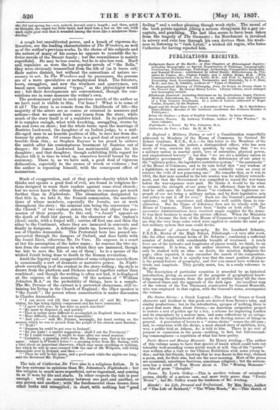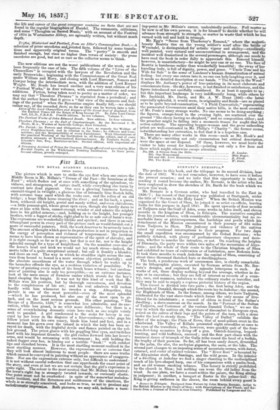PUBLICATIONS RECEIVED.
Boons.
Indigenous Daces of the Earth; or New Chapters of Ethnological Inquiry; including Monographs on Special Departments of Philology, Inconography, Cronioseopv, Paimontology, Pathology, Archreology, Comparative Geography, and Natural History : contributed by Alfred Maury, Bibliotheeaire de Pinstitut de France, Eze., Francis Pulsky, and J. Aitken kteigs, M.D. (With Communications from Prof. Jos. Leidy, M.D., and Prof. L. Ag,assiz, LL.D.) Presenting fresh Investigations, Documents, and Materials, by J. C. Nott, M.D., and Geo. R. Gliddon, Authors of "Types of Mankind."
The Biographical History of Philosophy, from its Origin in Greece down to the Present Day. By George Henry Lewes. Library edition, much enlarged and thoroughly revised.
Edinburgh Dissected: including Strictures on its Institutions, Legal, Clerical, Medical, Educational, fkc. To which are added, Confessions and Opinions of a Tory Country Gentleman. In a series of Letters addressed to Roger Cutler, Esquire, by his Nephew.
Egypt and the Great Sues Canal: a Narrative of Travels. By J. Barthelemy Saint-Hilaire, Member of the Institute (Academie des Sciences Morales et Politiques.) Below the Surface : a Story of English Country Life. In three volumes. Dorchester Pincers. By Anthony Trollope, Author of "The Warden." In three volumes.
Nightshade : a Novel. By Wm. Johnston, M.A.
Catherine be Vere: a Tale. By H. M. W.
Is England a Military Nation or not ? a Consideration respectfully addressed to Members of the House of Commons, by General Sir Robert Gardiner, K.C.B., R.A.—In this letter to the Members of the House of Commons, the author, a distinguished officer, who has seen much of war, answers his own question, by saying that "we are a military nation in martial spirit, love of enterprise' physical power, and unquestioned bravery " ; but that "we are not a military nation in legislative government.' He imputes the deficiencies of our army to the "military policy, the legislative restrictive system," "the parsimony" of the House of Commons, and to its vain belief that "any wisdom of a legislature, or any amount of wealth, can suddenly raise an army or retrieve the evils of not possessing one." He remarks that, as it was in 1816, the first note sounded in the late session was for military retrenchment, and that the Government was compelled to repeal the war-taxes before the war-expenses were paid. He thinks it would be far wiser to estimate the strength of our army by its efficiency than by its cost. And he calls upon the Lower House to vindicate the inglorious reproach of our not being a military nation, and by their legislative acts and policy to east it off for ever,' Such are the General's professional opinions ; and his experience and character well entitle them to consideration. But the blame of deficiency does not lie wholly with the House of Commons. There have been " faulta on both sides." The successive Administrations have received ample supplies for the Army. It was their business to make the service efficient. When the Ministers failed, it became the duty of the House of Commons to compel them to see that the very large sums voted were applied to sustain the most perfect military system that man could devise.
A Manual of Ancient Geography. By Dr. Leonhard Schmitz, F.R.S.E., Rector of the High School, Edinburgh.—A very able work, like the other educational books of Dr. Schmitz ; combining a sufficient number of details with considerable breadth of treatment A much freer use of the latitudes and longitudes of places would, we think, be an improvement. It is true, as the author observes, that geography can only be studied with an atlas : no doubt, the notation disfigures the page often repeated, it may encumber the march of the composition. All this may be ; but it is equally true that the exact position of places is the primal feature of geography, and that you cannot have without latitude and longitude. They greatly assist, too, in a ready reference to the atlas.
The description of particular countries is preceded by an historical introduction, giving an account of the progress of geographical knowledge among the ancients, from the period of mythic fancy tifi the close of classical times and the approach of the dark ages. An excellent map of the retreat of the Ten Thousand, constructed by General Monteith, who was employed in that region, with the General's notes, accompanies the volume.
The Statue Shrine : a Greek Legend.—The ideas of Greece or Greek character and incident in this poem are derived from Byron's tales, and similar productions but in the introduction, apropos of nothing, there is a good deal more productions; about Greece,—an American emigration project to restore a sort of golden age by a boy, a scheme for improving London and its atmosphere by a mature man, and some reflections by an octogenarian in the neighbourhood of Athens on the fleeting nature of things in general. A procession of lovers to a "statue shrine" rouses the old man ; and, in connexion with the shrine, a most absurd story of ambition, love, war, a public trial at Athens, &c. is told to him. There is no sort of purpose or connexion in the poem—nothing, in fact, but full-resounding commonplaces—a repetition of what has been poetry.
Poetic Hours and Miming Moments. By Henry Aveling.—The author of this volume seems to have that species of knack which could turn out tolerably well-sounding verses pretty much at will. One of the " poems " was written after a visit to the Chinese Exhibition with some young ladies; and his fair friends, knowing that he was fluent in this way, claimed a poem, and, for their sins, had one the next morning. Most of the pieces are occasional, sometimes facetious, sometimes religious ; but the seriousness has a touch of Tom Moore about it. The "Musing Momenta" are bits of prose "thoughts."
Poems. By Lewis Gidley.—This is another volume of occasional poems, chiefly of a serious cast, and more truly grave than "Poetic Hours " ; but Mr. Gidley wants the briskness of Mr. Aveling.
Handel : hia Life, Pereonal and Professional, By Mrs, Bray, Author of "The Life of Stothard," "The White Hoods," &e.—This sketch of
the life and career of the great composer contains no facts that are not found in the regular biographies of Handel. The comments, criticisms, and some "Thoughts on Sacred Music," with an account of the Festival of 1834 in Westminster Abbey, are agreeably written, but without much depth.
Trifles' Historical and Poetical, from an Idler's Commonplace Book.—A selection of prose anecdotes and,pointed facts, followed by some translations and apparently original verses. The 'poetry" is smooth and finished enough, but rises no higher than verses of society : the prose anecdotes are good, but not so rare as the collector seems to think.
The new editions are not the worst publications of the week, as has been frequently the case of late. The fifth volume of the "Lives of the Chancellors" is occupied with the lawyers of the Revolution and the early Brunswicks ; beginning with the Commissioners of the Great Seal under William and Mary, and closing with Lord Harcourt, Somers and Cowper being the intermediate men, with the addition of Lord Keeper Wright. Mr. Heade has issued another and a very neat edition of his "Poetical Works," in four volumes, with extensive revisions and some additions. Fiction being taken next to poetry as a matter of order, we may say that "Theodore Phranza" is reprinted from a periodical ; and that the author hopes that it gives a "fair view of the manners and feelings of the period" when the Byzantine empire finally fell,—we should rather say, of the recorded facts, so far as they can be woven into a tale.
Lives of the Lord Chancellors and Keepers of the Great Seal of England, from the Earliest Times till the Reign of King George IV. By John Lord Campbell, LL.D., F.R.S.E. Fourth edition. In ten volumes. Volume V.
The Poetical Works of John Edmund Reside. New edition. In four volumes. Theodore Phrases; or the Fall of Constantinople. By the Reverend J. M. Neale, M.A., Warden of Sackville College, East Grinsted.
The Parish : its Powers and Obligations at Law, as regards the Welfare of every Neighbourhood, and in relation to the State ; ito Officers and Committees; and the Responsibility of every Parishioner. With Illustrations of the practical Working of the Institution in all Secular .Affairs, and of some modern attempts at Ecclesiastical Encroachment. By Toulmin Smith, of Lincoln's Inn, Esq., Banister-at-law. Second edition, with important additions.
A Suntmary Account of Prises for Common Things offered and awarded by Miss Burdett Coutts, at the Whitclands Training Institution, In three parts. Second edition, greatly enlarged.
ing-point in Mr. Millais's career, undoubtedly perilous. Full master as he now is of his own powers, it is for himselt to decide whether he will advance from strength to strength, or scatter in Irate that which he has earned with toil and held in triumph. Mr. Egg's "Scene from 'Thaekeray's Esmond," where the majestic beauty Beatrix ties on the young soldier's scarf after the battle of Wynendel, is distinguished for artistic vigour and ability—excellently well painted, very natural and unconventional in arrangement, and the incident well dramatized in the several personages, although one needs to have read the book in order fully to appreciate this. Esmond himself, however, is unsatisfactory—he might be any one or no one. The face of Beatrix is handsome rather than wonderfully beautiful; the sway of her kneeling body, is full of dignity, power, and grace. "Uncle Toni and his Wife for Sale" is the acme of Lo.ndseer's human dramatization of aniiruil feeling : but every one enters into it, no one can help laughing over it, and it needs no detailed description at our hands. "The Spring in the Wood" displays Mr. Anthony's power of tree-painting in its most elaborate and consummate form : the sky, however, is not finished or satisfactory, and the figure introduced not carefully considered. So at least it appears to us ; but this important landscape is very indifferently hung, while others by Mr. Inchbold, Mr. Davis, and Mr. A. W. Hunt (566)—the latter especially splendid, it would seem, in originality and finish—are so placed as to be quite beyond examination. "A Field Conventicle," representing the persecuted Covenanters amid their native hills, is the most eccentric of Mr. Poole's many strange works. No one seems to be doing anything ; the figures, orange-hued in the evening light, are scattered over the ground "like sheep having no shepherd," and no composition either ; and the preacher might be falling into a mesmeric trance for aught that his action exhibits. The appealing beggar-woman and the gross unheeding priest are well-contrasted in Mr. l'hilip's " Charity ": the former seems, notwithstanding her entreaties, to feel that it is a hopeless ease. There are many other works in this room—such as Mr. Hook's and Mr. Wallis's—meriting not only enumeration but critical description, were the space at our disposal. Of these, however, we must leave the visitor to take count for himself,—pointing out only a few here and there which might otherwise escape attention.
No. 268. A Stream from the Hills B. Leader.
382. Our Housemaid Miss Boyce. 388 and 990. Irish Humorous Groups E. Nicol. 393. The Exile Ws. Gale.



























 Previous page
Previous page